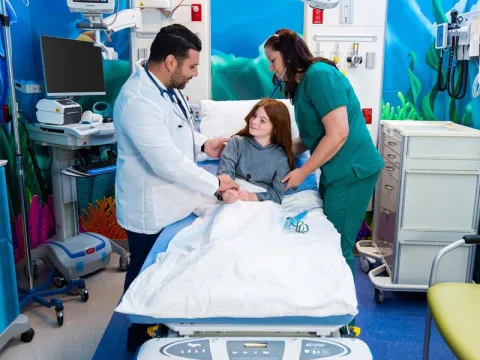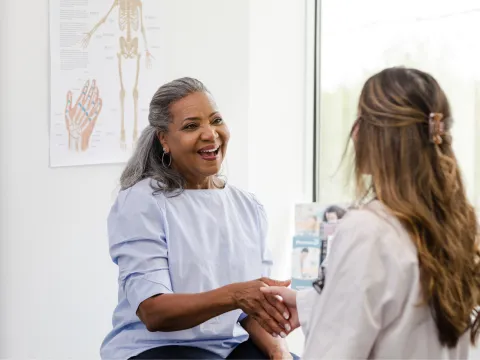- AdventHealth

Like so many diseases, the outlook for colorectal cancer depends on when it is found. If it’s caught early, before it spreads outside the colon wall, surgery to remove it is usually effective. More than 9 in 10 of these patients survive for more than five years.
But if colorectal cancer is detected later, after it’s spread beyond the colon wall, the survival rate is low, less than 10 percent. Unfortunately, only 37 percent of these cancers are detected early.
That’s why it's important to take steps to prevent colorectal cancer and get screened before you have symptoms. It’s also necessary to know what those symptoms are to increase your odds of catching it early. (If you think you already know what you need to about colorectal cancer screening, take this three-question quiz.)
Though most adults should get their first colonoscopy around age 45 or 50, that isn’t true for everyone. And the food we eat and the activity we undertake can affect our risk for colorectal cancer.
Here’s what you need to know about preventing colorectal cancer and getting tested.
How to Help Prevent Colorectal Cancer
AdventHealth’s CREATION Life philosophy teaches nutrition and exercise are critical parts of our health. That’s true for colon cancer, too. We can take little steps every day to reduce our risk.
Here are some suggestions on how to prevent colorectal cancer:
- Eat a diet low in red meat and processed meats like bacon
- Eat more veggies and fruits
- Exercise
- Watch the size of your belly
- Avoid getting type 2 diabetes
- Don't smoke
Unfortunately, there isn’t good evidence to show that vitamins and minerals make a difference in preventing colorectal cancer.
Some colorectal cancer has a genetic cause, meaning the person developed a mutation in their DNA or inherited faulty genes from their parents.
Even people who live healthy lifestyles can get colorectal cancer, so you should still be vigilant. In recent years, some newer options have emerged that allow for home testing.
Home Test Options and Their Accuracy
Getting tested at home is more convenient than going to the doctor — and may seem like the ideal option during the COVID-19 pandemic — but the stakes of missing colorectal cancer are high. These tests require people to collect one or more stool samples and mail them to a lab.
Here are some of the more common tests and their accuracy rates:
- Fecal Occult Blood Test (FOBT): This is a yearly test to detect the presence of blood in a stool. If repeated three times, it is 91 percent sensitive. This means that someone without colorectal cancer would get the correct reading 91 percent of the time.
- Fecal Immunochemical test (FIT): This test also detects blood in the stool, similarly to the FOBT test. It is about 80 percent sensitive.
- FIT-DNA test: This test combines the FIT test with one that looks for mutated DNA in the stool. One common example is called Cologuard. It is about 93 percent sensitive.
If everyone routinely took these tests, they would save lives. But they are still not as good as a colonoscopy, which can both identify and prevent cancer. Colorectal cancer starts small, as a growth called a polyp, and these can be removed during a colonoscopy.
Safety Precautions in Place for Your Screening
We understand that going in for a health screening may make you anxious right now. Since colonoscopies must be done in person, rest assured we’re doing everything we can to protect you while you’re here. Including:
Social Distancing
With limited visitation, waiting room protocols and more, you can safely practice social distancing in our facilities.
Temperature Checks
Have peace of mind that everyone you come in contact with has their temperature checked upon arrival.
Separate Waiting and Treatment Areas
COVID-19-positive and symptomatic patients are carefully quarantined away from patients and visitors.
Extra Sanitation Measures
Cleanliness has always been one of our top priorities, but now we’re taking extraordinary new steps to ensure thorough, frequent and ongoing sanitation happens around the clock.
Universal Mask Use
We’re stocked with safety supplies, have no shortages of personal protective equipment (PPE) and masks are required for all at our facilities.
When Should Your First Colonoscopy Be?
Traditionally, doctors have said most people should get their first colonoscopy around age 50. This is called a screening, and it means that even healthy people at that age with no symptoms should get tested.
An increasing number of younger adults are being diagnosed with colorectal cancer. So the American Cancer Society now recommends that adults get their first colonoscopy at age 45.
In addition, African-Americans have an increased risk of polyps and should get tested five years earlier.
Your doctor should recommend a colonoscopy when you approach 45 or 50, but if they don’t you should bring it up yourself.
The other exception concerns your relatives. If you have a parent, sibling or child with colorectal cancer, you should get tested at age 40 or at an age 10 years earlier than the relative was when they were diagnosed. For example, if your dad was diagnosed at age 44, you should get tested at age 34.
Though screening is the best way to prevent colorectal cancer or spot it early, being vigilant for its signs is also important.
What Should I Look for?
Make sure to talk to a doctor if you have any of these signs:
- Narrowing in width of stool
- Blood in stool
- Weight loss
- Abdominal pain
Again, reporting these symptoms early could mean the difference between spotting cancer when effective treatments exist or waiting until it’s too late.
Taking steps to protect yourself against colorectal cancer, the third-leading cause of cancer-related death, not only protects your body, it gives you peace of mind. Learn more about our gastrointestinal cancer care services at GetScreenedToday.com.



